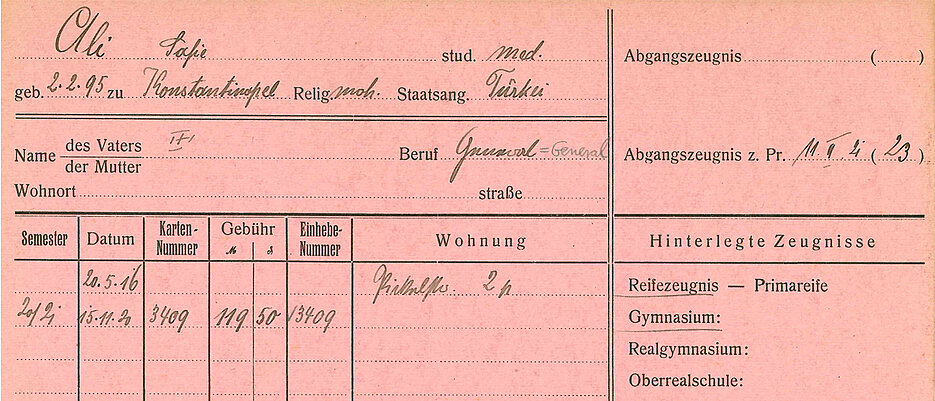A pioneer for women in medicine
03/09/2021She was the first woman to be licensed as a doctor in Turkey and to teach medicine there: Safiye Ali. She was educated at the University of Würzburg. On the occasion of International Women's Day on March 8, the university archive tells her story.

Safiye Ali is considered a pioneer for women in medicine. In her home country, today's Turkey, she was particularly committed to the medical education of women. She studied and earned her doctorate at Julius Maximilian University (JMU) in Würzburg. She graduated 100 years ago.
Safiye Ali was born on February 2, 1894 (*) in what is now Istanbul. Her career is remarkable, considering that education and medicine were almost exclusively the preserve of men at the time. She was therefore denied the opportunity to study medicine in her home country. Nevertheless, the young woman prevailed. She first attended college and then traveled to Germany on a scholarship, where she began studying medicine at the JMU in the summer semester of 1916.
Translated with www.DeepL.com/Translator (free version)
No regular study operation due to pandemic
Ali spent her studies in turbulent times. In her early semesters, for example, World War I raged, and as it drew to a close in 1918, a worldwide pandemic rolled into Germany in the form of the Spanish flu. The fact that the spread of a virus affects the regular course of studies can be well understood today through Covid-19. A vaccination, as it was developed against the Corona virus, did not exist at that time. It was not until the 1940s that the first influenza vaccine was developed. However, something could already be done against other diseases and accordingly the subject of vaccination was also dealt with at the university. Safiye Ali's enrollment lists show that she took a vaccination course in the summer semester of 1919.
There are still some documents on Safiye Ali in the holdings of the University Archives, such as her student file. The enrollment lists for the years 1916 to 1921 also bear witness to her studies in Würzburg. They list all the courses she took. If one takes a look at these, one can see that Safiye Ali was an extremely diligent student. From the summer semester of 1916 to the winter semester of 1920/21, she attended a total of 68 lectures, seminars and practical courses. This was extraordinary for the time.
Famous personalities in teaching
Her professors included a number of well-known personalities, such as Nobel Prize winner Wilhelm Wien, with whom Safiye Ali took courses in physics. Psychology with Karl Marbe, one of the most important representatives of the Würzburg School of the Psychology of Thought, was also on her schedule. Wilhelm Lubosch (anatomy), Hans Rietschel (pediatrics) and Karl Wesseley (ophthalmology) were also well-known physicians during Safiye Ali's time as a student and passed on their knowledge in their teaching. Incidentally, during Wesseley's time as head of the eye clinic, another woman made a name for herself: Josefine Schulte was the first woman to receive a doctorate in ophthalmology.
After studying under difficult conditions, but with capable professors in teaching, Safiye Ali finally received her doctorate on June 1, 1921, with her dissertation "On pachymeningitis haemorrhagica interna in infancy."
She then returned to Istanbul, where in 1923 she became the first woman in Turkey to be licensed as a physician and opened a practice in gynecology and pediatrics. Safiye Ali was not only clinically active, she headed numerous charitable organizations dedicated to the education and medical care of mothers and young children. In addition, she wrote several books and eventually went down in history as the first woman to teach medicine in Turkey. She offered medical education to young women at Robert College, the institution where her academic education began.
Shortly before her death, Safyie Ali settled in Germany. There, despite a bout with cancer, she continued her work through the years of World War II. On July 5, 1952, she died in Dortmund at the age of 58.
Due to her outstanding pioneering work for women in medicine, Google commemorated the scientist on the occasion of her birthday and dedicated a Doodle to Safiye Ali. The graphic, which is well worth seeing, was designed by Hüseyin Sönmezay.
(*) Regarding the date of birth, there are different statements in the documents of the university archives. Neither the date 1895 nor 1894 could be verified without doubt on the basis of sources.






